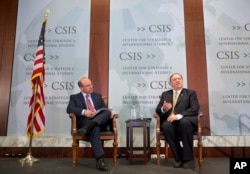The latest executive order signed by President Donald Trump would, in effect, amount to a full trade and financial embargo, squeezing all the revenue channels North Korea maintains to finance its weapons programs, a former senior counterterrorism official said.
On Sept. 21, less than two weeks after the U.N. Security Council approved new sanctions, Trump turned up the heat on the Kim Jong Un regime with an executive order that widens U.S. authority to sanction any bank and company that finance or facilitate trade with the communist country or any individual involved in the North Korean industries, ports and trade.
“To prevent sanctions evasion, the order also includes measures designed to disrupt critical North Korean shipping and trade networks,” said Trump, in reference to a 180-day ban on ships that have visited North Korea or have been involved in a ship-to-ship transfer with a vessel that has visited North Korea from entering the United States. “For much too long, North Korea has been allowed to abuse the international financial system to facilitate funding for its nuclear weapons and missile programs.”
Played a key role
In an interview with VOA's Korean Service, Juan Zarate, a deputy assistant to the president and deputy national security adviser for combating terrorism during the George W. Bush administration, said the new measures are “a full-freight, full-throated sanctions regime” that attempts to make any business with North Korea not only risky but intolerable. Zarate in September 2005 played a key role in sanctioning Banco Delta Asia, a private bank in Macau that has allegedly served as North Korea's principal conduit to the international financial network for both legal and illicit financial transactions.
“It certainly creates a sense of and the reality of a trade embargo,” said Zarate, who is currently a senior adviser at the Center for Strategic and International Studies. “And it makes very clear that financial institutions run the risk of falling prey to U.S. sanctions, secondary sanctions in essence, being imposed based on significant transactions.”
'A strong statement'
But he says North Korea has become savvy at evading sanctions, tapping a wide variety of ways to fund their nuclear and missile programs — for example, relying on North Korean labor overseas or opening channels of trade in African countries.
The recent U.S. move is another push to sensitize the market to the risks of North Korean commercial and financial activity, sanctions evasion and use of front companies, and to squeeze all of the potential channels of finance and commerce Pyongyang maintains.
Zarate’s assessment is echoed by another sanctions expert, Anthony Ruggiero, a former Treasury Department official who is now an analyst with the Foundation for Defense of Democracies. He said the new executive order is “a strong statement” that Chinese firms, individuals and banks must stop facilitating North Korea's sanctions evasion.
When asked whether the new measures were geared primarily toward China, Zarate invoked the Treasury's previous actions against Russian institutions complicit in Pyongyang's illegal activities and said he anticipates a chilling effect for businesses and banks in other countries.
Risks have to be considered
But Zarate said Chinese banks, companies, entities and networks will have to take note of the potential risk of sanctions that are tied to this new executive order, given that predominant trade with North Korea flows through and with China.
“Certainly this matches the administration’s rhetoric to try to put more pressure on China, to not only use economic and political influence to curb Pyongyang's programs but to try to squeeze Chinese entities directly that continue to do business with North Korea in violation not just of the U.N. sanctions but in violation of U.S. laws,” Zarate said.
It remains unclear whether this regulatory action, though “intense and powerful” as Zarate puts it, will shift Beijing’s calculus and leave Pyongyang’s longtime ally to press the Kim regime “both openly and quietly in ways that will affect the trajectory of their missile and nuclear programs.”
However, Zarate read as a positive sign China’s central bank's reported move to stop streams of Chinese funds into North Korea and China’s backing of the latest U.N. Security Council resolution that imposes a cap on the North’s oil imports and a ban on it’s lucrative textile exports.
While most experts agree the recent executive order is an important step forward in that it significantly strengthens U.S. sanctions, they also think sanctions take time to take hold.
Sanctions take time
“Sanctions aren’t the type of tool that works overnight,” according to Edward Fishman, a former State Department official who worked on U.S. sanctions policy in the Obama administration. “So it'll take time for the international community to assess the actual effect that they have on North Korea's economy.”
Wielding its expanded authority granted last week, the Treasury Department imposed sanctions Tuesday targeting eight North Korean banks and 26 individuals in China, Russia, Libya and the United Arab Emirates, said to have links to North Korean financial networks
“The Treasury's sanctions today against North Korean banks and overseas representatives are another warning that the Trump administration expects China, especially its banks to investigate and end these activities,” Ruggiero said.
VOA's Ham Jiha contributed to this report.






